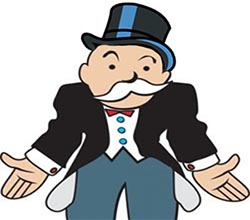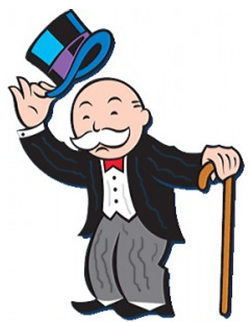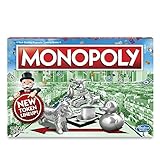
Check these Monopoly Editions
-
Cosmic Encouter Powers
Check here for all the additional powers. to play Monopoly like you never did before.
-
Fast Monopoly
-
Monopoly Free Parking
-
Monopoly Live
-
Monopoly Slots
Other Monopoly Editions
- Anti-Monopoly
- Monopoly City
- Monopoly Cheaters Edition
- Monopoly Deadpool
- Monopoly Deal
- Monopoly Fortnite
- Monopoly for Millennials
- Monopoly Frozen II
- Monopoly Game of Thrones
- Monopoly Friends
- Monopoly Gamer
- Monopoly Junior
- Monopoly Junior Electronic Banking
- Monopoly Junior Party
- Ms. Monopoly
- Monopoly Marvel Avengers
- Monopoly - Longest Game Ever
- Monopoly Peppa Pig
- Monopoly Socialism
- Monopoly Stranger Things
- Monopoly - The Mega Edition
- Monopoly The Simpsons
- Monopoly Speed
- Monopoly Revolution
- Monopoly Star Wars
- Monopoly Toy Story
- Monopoly Ultimate Banking
- Monopoly Voice Banking
Other Variations

Get Bankrupt
When a player lands on an unowned property, he must always buy it. The goal of the game is to get bankrupt before any other player.
Stock Exchange
The properties are companies) and you can buy "shares" in those companies when you land on the space. There are maximum 3 shares per location.
The stockholders can build offices (houses) or tower blocks (hotels) and receive dividends when other players land on those locations.
There are no mortgages since you sell shares when strapped for cash.
Auction the Start Order
Bid for the right to go first. If players do not wish to bid, order is resolved by dice rolls.
Staggered Start
The first player starts on go, the second on Just Visiting, the third on Free Parking, the fourth on Go To Jail, the fifth on Go, and so on...
Players are not allowed to buy property during his or her first trip around the board.
Buy or Auction
When you land on a space you can either:
- buy it for the base cost
- auction it and if anyone else wins the auction, YOU get their money.
Also, players start with half the stated amount of cash ($750).
No Easy Monopolies
When you land on the third unowned property in a monopoly, you may not purchase it outright if you own the other two properties. Instead, it must be sold at public auction (in which you can participate.
Quick Auctions
Use quick auctions as a way to get all the properties in play in a reasonable time. Whenever a doubles is thrown, the next unowned property clockwise from GO should be auctioned off by the banker, after the player throwing doubles completes his or her move.

Poor Start
Begin the game with only $200 (as if you just passed Go). To quote Tim, "It would certainly add something to the decision about whether to buy a property or not. And those $10 rents for St. Charles would suddenly become a big deal, for both players".
Less Chance... More Taxes
Get rid of the Chance/Community Chest cards:
- When you land on Chance, you are taxed $25 per house/$100 per hotel for each property *you* own on that particular row (for example, if you land on the Chance between Vermont and Oriental, you are only taxed on any houses/hotels you have on the Purple or Lt Blue properties).
- When someone lands on Community Chest, *everyone* is taxed $25 per house/$100 per hotel for each property they own on that particular row.
Three Dice
The player get 3 dice to roll and he or she can pick 2 dice to determine the movement.
Movement Control
Give each player a set of six cards, 1-6. On their turn, they pick one of the cards from their hand and add the roll of one die to it. This gives you a little more power in how far you advance. If you're trying to move slowly, play the (1) and you'll move from 2-7 spaces. Vice versa, a play of (6) gives you at least 6 spaces, and possibly 12.
A player must go through all of their die cards before taking them back into his hand.
Deck of Playing Cards
Add a deck of 52 playing cards, composed as follows:
- Hearts read as "+2"
- Diamonds read as "+1"
- Clovers read as "-1"
- Spades read as "-2"
Every time a player passes or lands on Go, in addition to collecting his salary he picks a Strategy Card. He keeps this card face down until he chooses to use it. Strategy Cards may be traded or sold between players.
A player may use a Strategy Card after he rolls the dice. He plays the card, adjusts the roll by the amount indicated on the card, and then places the card on the bottom of the Strategy Deck. For example, if a player rolls a "7" and then plays a "-2" Strategy Card, he moves his token 5 spaces. A player may never play more than one Strategy Card per turn.
A modified roll can be as high as 14 (a +2 applied to a natural roll of 12) or as low as 0 (a -2 applied to a natural roll of 2). In the latter case, the player's token stays where it is and his turn proceeds just as if he had landed on that space.
In addition, players only get credit for rolling doubles (which gives them an extra turn) if the natural roll is doubles and if no card is played.

Real Free Parking
You don't collect any money for landing on Free Parking. All payments required by chance or community chest go to the bank and not the center of the board.
Ghost Players
Bankrupt players become ghosts that haunt for money. When a host lands on a location, the owner must pay the ghost money.
Hostile Takeovers
When a player pays 3 times the face value of a property, then the hostile buyer and the current owner may roll a dice. Whoever score the highest wins and becomes the owner of the property.
Continue Reading


